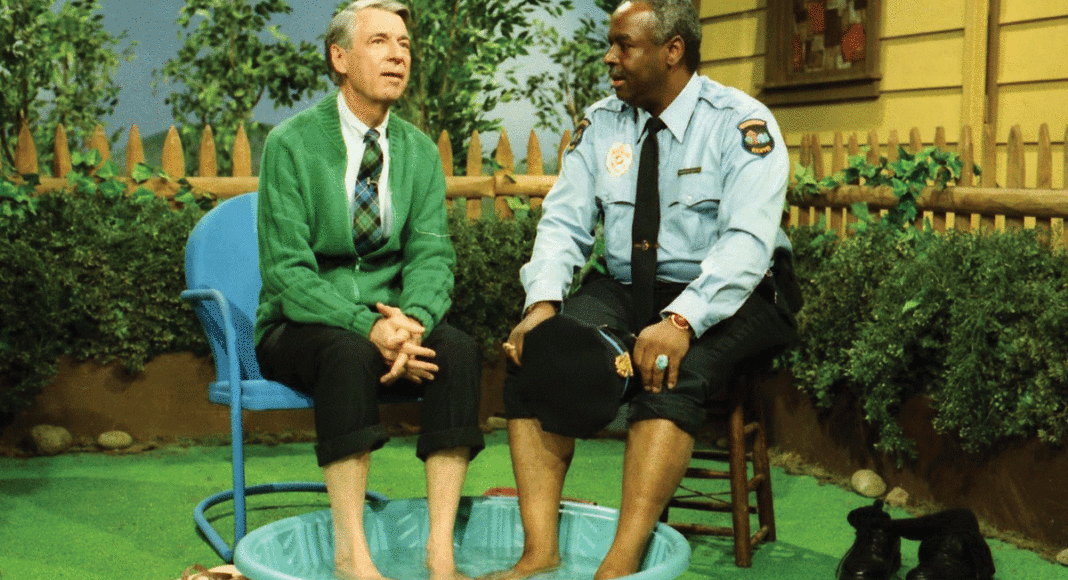A paranoid, autocratic king, terrified of change, builds a wall to keep out strangers. His people react with dismay. Will the forces of peace, love, and common sense be defeated by one man’s irrational fear?
A story ripped from today’s headlines? Guess again. The year was 1968, and this vignette was featured on an early episode of a new children’s program called Mr. Roger’s Neighborhood, on National Education Television (NET—soon to be replaced by PBS). The Summer of Love was over, but the vibe of change that would cause so much cultural upheaval as the year progressed was already in the air.
The origin, influence, and legacy of Mr. Rogers’ Neighborhood is the subject of the excellent documentary, Won’t You Be My Neighbor? It’s another engrossing peek behind the scenes of a popular culture phenomenon by filmmaker Morgan Neville, whose previous films were the Oscar-winning 20 Feet From Stardom, and The Music of Strangers: Yo-Yo Ma and the Silk Road Ensemble.
As creator and star of Neighborhood, Fred Rogers is best remembered for his comfy cardigan sweaters, his relaxed, soft-spoken on-air demeanor, and the fanciful world of puppets and sing-along songs he created for his vast audience of preschool-age children. But in Neville’s skillful hands we see just how radical Mr. Rogers could be, not only in the way he tapped into the darkest parts of the cultural zeitgeist to help kids cope with them, but also in insisting that every child is unique, valid, and deserving of respect. (A message that could not be more timely in the present, horrifying historical moment.)
Fred Rogers was on track to become a Presbyterian minister when he detoured into educational television in his native Pittsburgh. He hated the violent, pie-in-the-face slapstick of early children’s TV programming, and worked on early shows as a puppeteer and musical accompanist, developing his own approach. He wanted to connect with children as people, not just provide distraction, which he thought would be a much better use of such a powerful new medium. In an early TV interview, playing a series of musical modulations on the piano, he explains his mission as, “helping kids through the different modulations of life.”
The debut of his own show on WQED, Pittsburgh, in February of 1968, was not so auspicious. As one member of the former production team laughs, “If you took all the elements that make good television” (like expensive sets, and a well-known star), “and did the exact opposite, that was Mr. Rogers’ Neighborhood.”
Yet the show clicked with kids and was picked up by more PBS stations across the country. And soon enough, Rogers was tackling those “modulations.” After Robert Kennedy was assassinated, timid tiger puppet Daniel seeks comfort from one of the show’s human co-stars, who reassures him it’s natural to feel sad during scary times. When black families were chased out of a public swimming pool by white, chemical-dumping racists during the Civil Rights Movement, Mr. Rogers invited the black policeman character on his show to join him in soaking their feet together in Mr. Rogers’ wading pool.
The shy, sensitive puppet Daniel Striped Tiger, voiced by Rogers, also became Roger’s alter-ego on the show. Kind-hearted, and deeply in touch with his own feelings, Daniel gave voice to the questions and concerns that Rogers perceived were in the minds of all children when life became too confusing. His intuition is borne out in footage of Rogers meeting kids and pulling out Daniel. He’s only a simple, slightly faded glove puppet, obviously attached to Mr. Rogers’ arm, but children respond with the same joy and awe as if he were alive.
Trust Fox News to provide a dissenting opinion; one pundit blames Rogers’ insistence that every child is “special” for creating a brainwashed generation that feels entitled. (To, um, basic human rights?)
But Rogers has the last word. To the compassion-challenged, he explains his simple message: “to let every child know they’re loved—and loveable.”
WON’T YOU BE MY NEIGHBOR?
*** (out of four)
With Fred Rogers. Directed by Morgan Neville. A Focus Features release. Rated PG. 93 minutes.














Thank you, this is a really good review, but I would give it 4 stars out of 4.